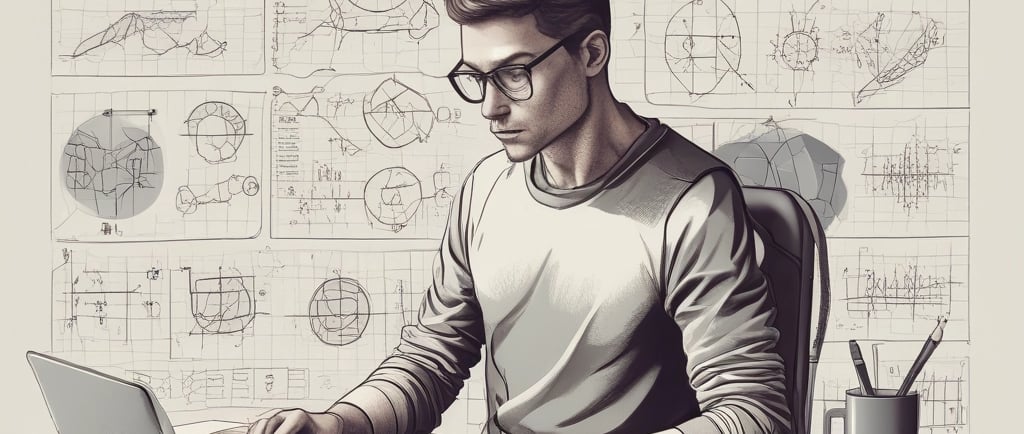Learn Hard Skills in 2025: Boost Productivity
Discover effective strategies to learn any hard skill in 2025. Eliminate distractions, boost productivity, and transform your personal life with actionable tips and real-life stories. Spend less time on social media and focus on deliberate practice for lasting success.
TIPS
Jackson Hill
11/4/20255 min read


Learn Any Hard Skill in 2025: Eliminate Distractions, Master Productivity, and Transform Your Life
Table of Contents
Introduction: The Truth About Hard Skills
Step 1: Slow Down and Prioritize Deep Work
Step 2: Eliminate Distractions
Step 3: Create a Personal Roadmap for Skill Mastery
Step 4: Leverage Community and Accountability
Step 5: Build Mental and Physical Routines
Step 6: Reduce Social Media, Increase Self-Improvement
Step 7: Make Mastery a Lifestyle, Not a Sprint
Conclusion
Introduction: The Truth About Hard Skills
I want to start with a truth that feels counterintuitive: the fastest way to get good at something hard is often to slow down. You’ve heard people talk about “grinding” and “hustling,” but what they rarely mention is that your brain, attention, and focus are your most precious resources. Waste them, and no amount of hours will bring mastery.
I remember a listener, Gabrielle, a 15-year-old coding enthusiast. She was spending eight hours a day learning app development, juggling school, homework, and exams. Ambitious? Absolutely. Sustainable? Not at all. Her brain was constantly switching between tasks, overloaded, and creativity was burning out faster than her motivation. What helped her wasn’t forcing more hours—it was structured, deliberate effort.
This is the secret I want to share: slow productivity. It’s not laziness. It’s working at a sustainable pace, where each step builds real, measurable skill. It’s about learning the hard way—but efficiently.
Step 1: Slow Down and Prioritize Deep Work
Think of learning like climbing a staircase. You can’t jump to the top. Each step requires focus, repetition, and reflection. Some days you move two steps; other days, just one. The key is consistency, not speed.
Practical tip: Pick one skill per day to focus on for 90 minutes of uninterrupted deep work. Put your phone in another room. Close all social tabs. If your skill is coding, for instance, work on one specific problem or module rather than trying to “learn everything at once.”
Example: I once had a friend learning French. She tried cramming vocabulary for hours at night while scrolling Instagram. Progress was minimal. Once she switched to 20-30 minutes of focused vocabulary, then speaking practice with a partner, she noticed measurable improvement within weeks.
It reminds me of how Cal Newport talks about learning complex skills in his podcast. He compares it to video games: people think, “I should be great after a few months of effort,” but real skill acquisition is step by step, with slow, deliberate progression. You have to respect the refractory period your brain needs to absorb and integrate knowledge. Gabrielle learned this the hard way—frustration at first, but after months of calibrated effort, she started creating real, usable code.
Step 2: Eliminate Distractions
Social media, notifications, endless content scrolling—they’re the biggest thieves of your attention. Every ping is a small drip of wasted energy.
Practical tip: Start with a “digital detox window” of two hours daily. Gradually increase it. Use tools like Focus Mode, Forest App, or browser blockers. Replace the lost scrolling time with activities that recharge your mind: reading, walking, or journaling.
Example: Nick Offerman tells stories of buying an RV during the pandemic and traveling cross-country. He immersed himself fully in the experience—no phones, no notifications. That kind of intentional attention is what allows mastery to flourish, whether it’s in travel, coding, writing, or art.
Storytelling insight: This isn’t just about eliminating noise—it’s about creating the space to see your own progress and think deeply. Just like the Slow Productivity Corner listeners discussed on Cal Newport’s podcast, expressing frustration about time and attention is the first step to reclaiming control. Once Gabrielle started turning off notifications, her productivity and clarity soared.
Step 3: Create a Personal Roadmap for Skill Mastery
A roadmap gives structure to your ambition. Without one, you’re guessing and burning energy on tasks that may not move you forward. Here’s a practical framework:
Break It Down
Identify one core skill and split it into micro-skills.
Example: Learning guitar? Break it into: chord transitions, strumming patterns, scales, and fingerpicking. Work on one micro-skill per session.
Set Achievable Milestones
Focus on progress markers, not hours spent.
Example: Instead of “practice 3 hours today,” aim for “master the C-G chord transition without mistakes for 10 minutes.”
Schedule Reflection Time
After each practice session, ask: “What went well? What felt challenging? What can I tweak tomorrow?”
Example: Gabrielle kept a coding journal. Every evening, she wrote three things she learned, one bug she solved, and one insight about her learning process. Reflection doubled her learning efficiency.
Celebrate Small Wins
Don’t wait for mastery to feel accomplishment. Recognize tiny victories, like completing a chapter, solving a problem, or creating your first small project.
Storytelling insight: On the podcast, Andrew shared how forming a “Slow Productivity Affinity Group” at his university gave participants a space to celebrate wins and vent frustrations. Some members were more focused on slow, deliberate reflection; others were more productivity-driven. Both perspectives were important. The takeaway? A support system accelerates mastery.
Step 4: Leverage Community and Accountability
Learning alone can be lonely and demotivating. Surround yourself with people who are also committed to growth.
Practical tip: Form a study or practice group—even online. Share your progress weekly. Discuss challenges. Ask questions.
Example: Andrew’s university group met weekly to review coding exercises, exchange feedback, and celebrate wins. The accountability helped him sustain effort for months, far beyond what solo practice would allow.
Storytelling insight: Community doesn’t just improve your skill—it changes your relationship with work. You see that mastery is shared, supported, and celebrated, not just a lonely grind.
Step 5: Build Mental and Physical Routines
Your body fuels your brain. Deep learning is impossible without attention and energy.
Practical tip:
Sleep 7–8 hours consistently.
Take short walks or stretch breaks during long practice sessions.
Eat nutrient-rich meals to avoid crashes.
Example: I once tried coding for 5 hours straight without a break. By hour three, errors skyrocketed, and frustration set in. When I incorporated 25-minute focus sprints with 5-minute movement breaks, my efficiency nearly doubled.
Storytelling insight: Even Cal Newport reflects on this in his work—building a sustainable pace is what keeps his output high over years, not bursts of unsustainable effort.
Step 6: Reduce Social Media, Increase Self-Improvement
Time spent scrolling is opportunity cost. Every hour you spend on curated content is an hour not spent building real skill.
Practical tip: Replace social media with self-improvement micro-habits:
Read a book for 20 minutes.
Journal your goals and progress.
Practice meditation for focus and calm.
Example: I replaced my morning Instagram scroll with reading essays by Windle Berry. Within weeks, I felt more focused, motivated, and inspired in my own writing.
Storytelling insight: The act of intentional learning—even small, daily choices—compounds over time. Gabrielle noticed it with coding; Andrew noticed it with writing groups. This principle is universal.
Step 7: Make Mastery a Lifestyle, Not a Sprint
The biggest mistake is treating skill-building like a short-term project. Mastery is a marathon, not a sprint.
Practical tip: Choose skills that align with your long-term life vision. Build systems, not just effort. Ask yourself daily: “Is what I’m doing today creating sustainable growth?”
Example: Windle Berry left NYU to farm intentionally with horses. He rejected shortcuts and embraced slow, meaningful work. His life teaches us that intentional, consistent effort over decades creates impact far beyond quick wins.
Storytelling insight: Reflecting on your own life and goals—like Cal Newport did in his 40s—helps anchor your productivity. Instead of burning out chasing temporary goals, you create a life that’s aligned, deep, and fulfilling.
Conclusion
Mastering any hard skill in 2025 isn’t about hacks or AI shortcuts. It’s about attention, patience, and deliberate practice. Social media will try to pull you away. Modern life will demand instant gratification. But if you protect your focus, slow down, and engage in structured, reflective practice, your growth will compound in ways that feel almost magical.
Remember Gabrielle coding, Andrew in his study group, Nick Offerman traveling, Windle Berry farming—all different fields, different times, but the same principle: mastery demands intention, time, and reflection.
Start today. Build your staircase. Take one step at a time, and watch your life transform.
“If you get the basics right, the details take care of themselves. Focus on mastery, not speed.”
